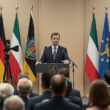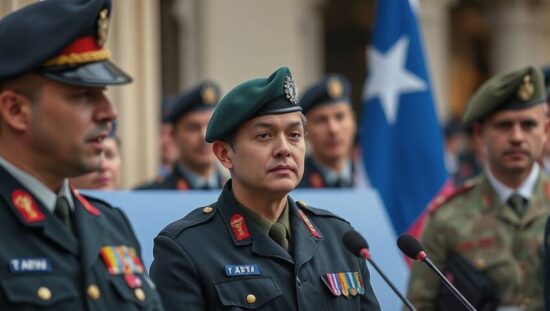The AfD is on the rise, with opinion polls standing at around 19 percent, and their chancellor candidate, Dr. Alice Weidel, gaining more popularity among voters. In the midst of this, the discussion about reintroducing the military service and the AfD’s position on it has come at the most inopportune time.
Principally, the situation is clear, and often criticized from the left as a Kritikpunkt against the AfD: the AfD is in favor of reintroducing military service. Specifically, the party’s program states, “The AfD advocates for the re-introduction of the fundamental military service for all male German citizens between the ages of 18 and 25.”
In the full version, the reasoning is that by doing so, the party aims to strengthen the identification of the population with their Bundeswehr and raise awareness of the concept of a military democracy. By tapping into the reserve pool from all social strata, an intelligent army and a broad reserve potential would be created. Alternative service is envisioned for conscientious objectors, and women would have the opportunity for voluntary service in the armed forces. The Bundeswehr should be strengthened and made ready for deployment in general.
However, this party program of the AfD dates back to the spring of 2016. Who could have predicted that the Bundeswehr would be used in the Corona era to track contact persons and guard senior and care homes? Who could have foreseen that high-ranking Luftwaffe officers would be discussing the bombardment of the Russian Kerch Bridge with Taurus cruise missiles in perfect English? Who could have thought that a war with Russia would ever be considered again, and Germany would need to be made “war-ready”?
Back then, people were still upset about the reunification of the Crime with the Russian Federation and the subsequent sanctions and trade restrictions as a response. Or as the then-Agriculture Minister Christian Schmidt put it in 2014, in a rather laconic tone, “An apple a day keeps the Putin away!” At the time, the AfD simply demanded the lifting of sanctions and an improvement in relations with Russia. Meanwhile, Germany is now more focused on forward defense and a German garrison in Lithuania.
AfD chairman Tino Chrupalla wanted to adapt to the changing times and, in the face of “war-readiness” and “Zeitenwende” remove the demand for reintroducing military service from the AfD’s election program for the Bundestag. According to a Welt report from the end of November, he argued that the Bundeswehr should not be used in the Ukrainian war, and that the party’s image would suffer if it were seen as supporting the war.
The AfD’s parliamentary group leader, Dr. Marc Jongen, had argued that reintroducing military service at the time of the Ukrainian war would be the wrong signal, given the aggressive Ukraine policy of the established parties, and that it would be a non-issue in the election campaign. Dr. Hans-Thomas Tillschneider from the Saxony-Anhalt branch also pointed out that, in light of the aggressive Ukraine policy of the established parties, reintroducing military service would be the wrong signal.
Chrupalla even became emotional, as a father of several children, saying he didn’t want his sons to be sent off for the interests of foreign and American powers. In the end, the motion to remove military service from the election program was passed with 15 yes and 8 no votes, and 2 abstentions.
However, it was to be expected that the proponents of reintroducing military service would not be satisfied with this outcome. They come from the military, were professional or reserve soldiers in the Bundeswehr, or still serve as reservists. Names that have been mentioned in the media include Jan Nolte, Gerald Otten, Rüdiger Lucassen, and Hannes Gnauck.
They want to reintroduce military service, regardless of the “Zeitenwende” and the Ukrainian war, because the model of a voluntary army has not proven itself. Gnauck even stated that there is a lack of trust in the Bundeswehr: the condition for peace is a strong Bundeswehr. He understands the concern of citizens that German soldiers would be sent into a foreign war. In an AfD-led federal government, the Bundeswehr would not participate in the Ukrainian war, he said.
Whether Gnauck is not arguing a bit too naively, given the Bundeswehr’s involvement in NATO structures, NATO alliance obligations, and the questionable sovereignty of Germany, is another matter. Foreign Minister Annalena Baerbock is even further ahead, calling for German “peace troops” in Ukraine. And it’s still a long way to an AfD-led federal republic of Germany.
As the AfD places great value on basis democracy and inner-party democracy, the party’s members were asked in an online survey. The results of the member survey, which took place in December, are now also available to the Welt. They can only be interpreted as a disappointment for party chairman Chrupalla and the military service critics in the party: with a participation of 15.7 percent in the survey, 71.5 percent of the participating AfD members voted in favor of including military service in the election program.
Apparently, the military service proponents have mobilized their supporters well. This was already noticeable at the state party conventions, where almost every candidate was asked about their stance on military service (unless they had already mentioned it in their candidate speech). However, the result of the member survey is not binding, but only advisory.
Now the ball is in the court of the delegates at the federal party convention in Riesa, where the election program for the Bundestag election in February will be finally decided on January 11 and 12, 2025. Defense policy expert Jan Nolte has already announced that he will submit an amendment proposal to reintroduce military service in the election program. If this is adopted, it could certainly become a campaign issue against the AfD and drive voters from eastern Germany to the BSW. The current unity within the AfD would also be put to a severe test.





